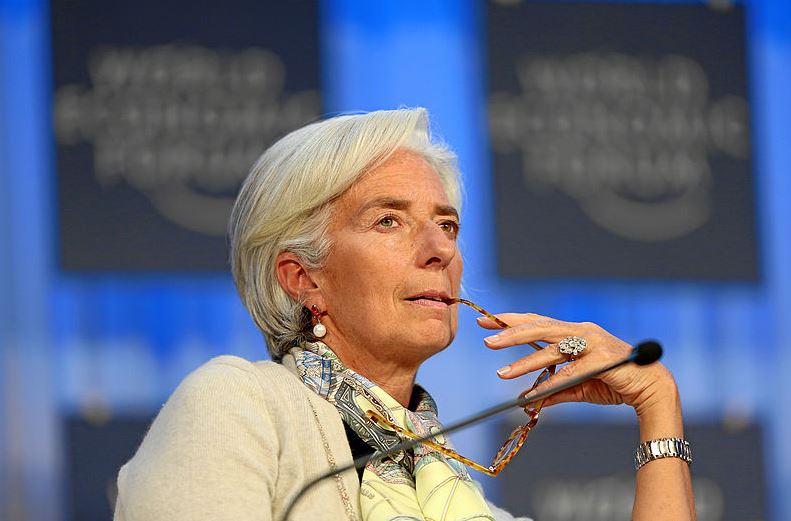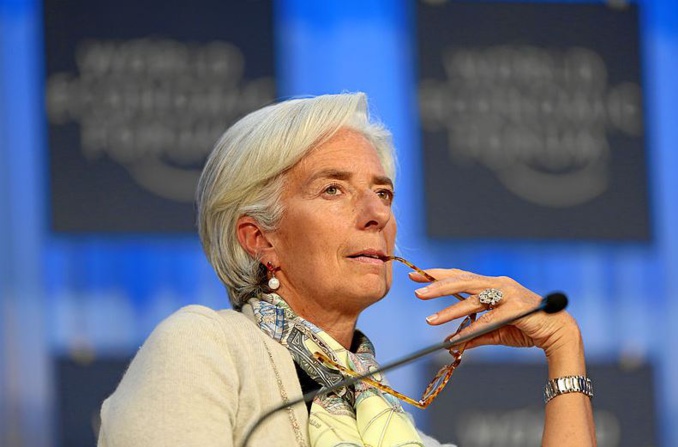The summit in Davos will be held on 23-26 January. Its main theme is "Creating a Shared Future in a Fractured World". Seven co-chairpersons of the forum represent different spheres - private and public sectors, international organizations, trade unions, academia, civil society and social entrepreneurship, the website of the WEF notes.
Among then are Sharan Burrow, general secretary of the International Trade Union Confederation; Fabiola Gianotti, specialist in the physics of elementary and sub-elementary particles, Director General of the European Organization for Nuclear Research; Isabelle Koher, CEO of the energy company ENGIE Group, the first woman to lead a company, which is part of France's main stock index CAC 40; Christine Lagarde, Managing Director of the IMF; Ginni Rometty, CEO, President and Chairman of the Board of Directors of IBM; Chetna Sinha, social entrepreneur, microfinance, farmer, founder and president of Mann Deshi Mahila Bank and the Mann Deshi Foundation in India; Erna Solberg, Prime Minister of Norway.
Last year was marked by increased attention to issues such as the status of women in society, gender equality, sexual harassment. On January 21, the day after the inauguration of Donald Trump, more than 1 million people took to the streets of the US to protest against the new president. The rally in Washington, which itself gathered more than 0.5 million people, turned into large-scale protests around the world, dubbed the "Women's March". The rallies took place in Vienna, Paris, London, Berlin, Rome, Tokyo, Sydney and many other cities. Their participants advocated for women's rights and against the sexist and anti-Muslim statements of Trump. And at the end of the year a whole series of scandals involving sexual harassment broke out. It began with an article in The New York Times, where several women talked about the obscene behavior of Hollywood producer Harvey Weinstein.
The choice of the co-chairs of the Davos summit of women is more likely a coincidence, the WEF notes. As always, they were invited on the basis of their outstanding activities as leaders, rather than consciously getting all women at the head of the summit. The candidates are nominated by representatives of the groups in which they work within the framework of the WEF for a year; this process begins in the spring, and ends in September. In 2017, there were five co-chairmen, of whom two were men.
"The appointment of women as co-chairs of the Davos 's Forum emphasizes both the increased attention to gender issues and the fact that the situation in which so many women won the right to manage such events remains the exception rather than the rule," says Tina Fordham, the chief global political analyst Citigroup. In the past two years, she herself has participated in the work of the UN Commission on Gender Equality and Women's Empowerment. According to Citi, "a significant and achievable reduction in gender disparity in the workplace can possibly add about 6% to GDP in developed countries in one to two decades." "This is a very significant figure compared to the potential of other structural reforms," Citi said in its report Women in the Economy, prepared in late 2017.
source: cnbc.com
Among then are Sharan Burrow, general secretary of the International Trade Union Confederation; Fabiola Gianotti, specialist in the physics of elementary and sub-elementary particles, Director General of the European Organization for Nuclear Research; Isabelle Koher, CEO of the energy company ENGIE Group, the first woman to lead a company, which is part of France's main stock index CAC 40; Christine Lagarde, Managing Director of the IMF; Ginni Rometty, CEO, President and Chairman of the Board of Directors of IBM; Chetna Sinha, social entrepreneur, microfinance, farmer, founder and president of Mann Deshi Mahila Bank and the Mann Deshi Foundation in India; Erna Solberg, Prime Minister of Norway.
Last year was marked by increased attention to issues such as the status of women in society, gender equality, sexual harassment. On January 21, the day after the inauguration of Donald Trump, more than 1 million people took to the streets of the US to protest against the new president. The rally in Washington, which itself gathered more than 0.5 million people, turned into large-scale protests around the world, dubbed the "Women's March". The rallies took place in Vienna, Paris, London, Berlin, Rome, Tokyo, Sydney and many other cities. Their participants advocated for women's rights and against the sexist and anti-Muslim statements of Trump. And at the end of the year a whole series of scandals involving sexual harassment broke out. It began with an article in The New York Times, where several women talked about the obscene behavior of Hollywood producer Harvey Weinstein.
The choice of the co-chairs of the Davos summit of women is more likely a coincidence, the WEF notes. As always, they were invited on the basis of their outstanding activities as leaders, rather than consciously getting all women at the head of the summit. The candidates are nominated by representatives of the groups in which they work within the framework of the WEF for a year; this process begins in the spring, and ends in September. In 2017, there were five co-chairmen, of whom two were men.
"The appointment of women as co-chairs of the Davos 's Forum emphasizes both the increased attention to gender issues and the fact that the situation in which so many women won the right to manage such events remains the exception rather than the rule," says Tina Fordham, the chief global political analyst Citigroup. In the past two years, she herself has participated in the work of the UN Commission on Gender Equality and Women's Empowerment. According to Citi, "a significant and achievable reduction in gender disparity in the workplace can possibly add about 6% to GDP in developed countries in one to two decades." "This is a very significant figure compared to the potential of other structural reforms," Citi said in its report Women in the Economy, prepared in late 2017.
source: cnbc.com



















